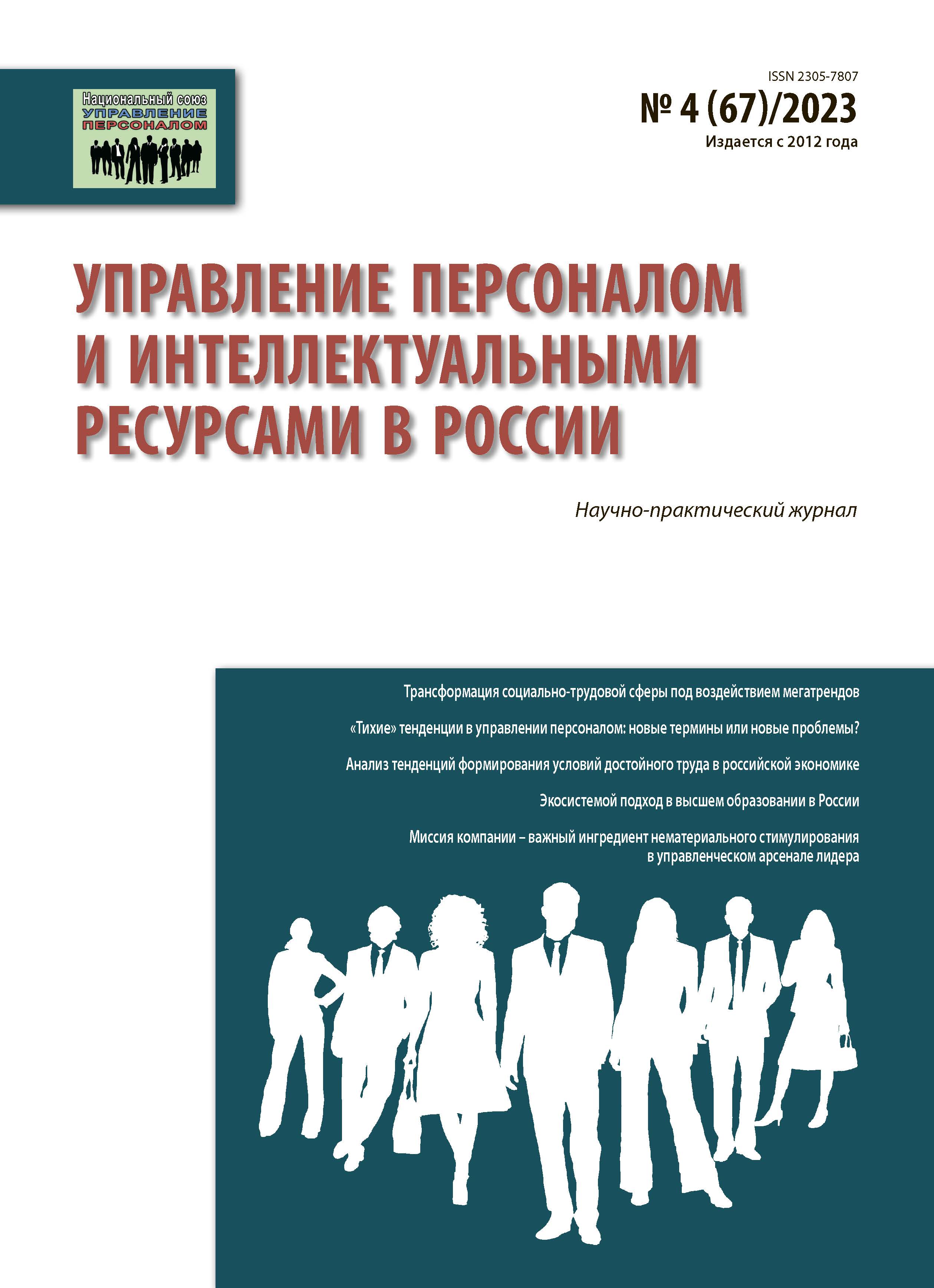Moskva, Moscow, Russian Federation
Russian Federation
The article examines the main consequences of megatrends for the Russian social and labor sphere: the labor market, the personnel management system in Russian organizations, in particular, shows how the Russian historical, political and cultural context leads to differences in the impact of megatrends, outlines practical solutions that Russian companies have implemented in the recruitment and selection process, training and development, organization of labor, motivation and consolidation of personnel management activities within the framework of corporate systems. It is shown that in recent years the Russian practice of personnel management has undergone a complex transformation in response to new technologies and markets, as well as to the changing political and social environment in the country. In a diverse business landscape (characterized by significant diversity in terms of the type of industry, form of ownership and access to resources), a special cluster of firms has formed that adhere to the “investing in people” approach. Companies in this cluster use digitalization and IT technologies to perform key personnel management functions, look for talents for effective management of knowledge workers, revise motivation methods and labor organization, and adjust their business models to solve social, demographic, environmental and other problems.
megatrends, trends, social and labor sphere, labor market, personnel management, demographics, environments, digitalization and IT technologies
1. ASI (Agentstvo strategicheskih iniciativ) i MShM «Skolkovo» (Moskovskaya shkola menedzhmenta «Skolkovo»). Atlas novyh rabochih mest, 2-e izd. Moskva, 2015.
2. Gribanov V. Privychnaya nagrada // Kommersant', 2019.№ 232. - C. 59-60.
3. Mitrofanova E.A., Mitrofanova A.E. Molodezh' na rynke truda // Upravlenie personalom i intellektual'nymi resursami v Rossii. 2021. T. 10. № 6. S. 72-78. DOI: https://doi.org/10.12737/2305-7807-2022-10-6-72-78; EDN: https://elibrary.ru/UIQWHM
4. Rossiyskiy rynok truda cherez prizmu demografii [Tekst]: monografiya / pod red. V.E. Gimpel'sona, R.I. Kapelyush-nikova; Nac. issled. un-t «Vysshaya shkola ekonomiki». -M.: Izd. dom Vysshey shkoly ekonomiki, 2020. - 436, [4] s. - 500 ekz. - ISBN 978-5-7598-2167-0 (v per.). -ISBN 978-5-7598-2209-7 (e-book).
5. S rynka truda smylo molodezh' [Elektronnyy resurs]. - URL:https://www.rbc.ru/newspaper/2023/04/11/6433e7499a 7947356c70a065 (Data obrascheniya: 8.07.2023).
6. Svistunov V.M., Lobachev V.V. Cifrovizaciya ekonomiki: sovremennye tendencii i osobennosti // Upravlenie personalom i intellektual'nymi resursami v Rossii. - 2022. - T. 11, № 5. - S. 5-10. DOI: https://doi.org/10.12737/2305-7807-2022-11-5-5-10; EDN: https://elibrary.ru/LYOZWL
7. Sokolov A. Instituty razvitiya provalili innovacii //Vedomosti, № 3, 2021.
8. Upravlenie personalom v Rossii: ot ego- k ekosisteme: monografiya / pod red. I.B. Durakovoy. - M.: INFRA-M, 2022. - 281 s. - (Nauchnaya mysl'). - DOI 10.12737/ 1567065. ISBN 978-5-16-017041-14
9. Chislennost' molodyh rabotnikov v Rossii opustilas' do istoricheskogo minimuma [Elektronnyy resurs]. -URL: https://finexpertiza.ru/press-service/researches/2023/chisl-mol-rab-min/ (Data obrascheniya: 8.07.2023).
10. Björkman, Ingmar, Carl F. Fey, and Hyeon Jeong Park. 2007. “Institutional Theory and MNC Subsidiary HRM Practices: Evidence from a Three-Country Study”. Journal of Interna-tional Business Studies 38 (3): 430-446.
11. Buck, Trevor, Igor Filatotchev, Natalia Demina, and Mike Wright. 2003. “Insider Ownership, Human Resource Strategies and Performance in a Transition Economy”. Journal of Inter-national Business Studies 34 (6): 530-549. DOI: https://doi.org/10.1057/palgrave.jibs.8400065; EDN: https://elibrary.ru/LYBAXP
12. Evseeva, Oksana, Olga Kalchenko, Svetlana Evseeva, and Kristina Plis. 2019. “Instruments of Human Resource Mana-gement Based on the Digital Technologies in Russia”. In Proceedings of the International Conference on Digital Techno-logies in Logistics and Infrastructure (ICDTLI 2019), edited by Igor V. Ilin, 148-154. Paris: Atlantis Press.
13. Fey, Carl F., and Ingmar Björkman. 2001. “The Effect of Hu-man Resource Management Practices on MNC Subsidiary Performance in Russia”. Journal of International Business Studies 32 (1): 59-75. DOI: https://doi.org/10.1057/palgrave.jibs.8490938; EDN: https://elibrary.ru/LSIXVN
14. Gurkov, Igor. 2004. “Business Innovation in Russian Industry”. Post-Communist Economies 16 (4): 423-438. DOI: https://doi.org/10.1080/1463137042000309548; EDN: https://elibrary.ru/RNFTRD
15. Gurkov, Igor, and Alexander Settles. 2013. “A Dominant Ar-chetype of the HRM System in Russian Industrial Companies in Post-recession Times”. International Journal of Human Re-source Management 24 (19): 3630-3643.
16. Gurkov, Igor, and Olga Zelenova. 2011. “Human Resource Management in Russian Companies”. International Studies of Management and Organization 41 (4): 65-78. DOI: https://doi.org/10.2753/IMO0020-8825410404; EDN: https://elibrary.ru/PEQYGJ
17. Holden, Nigel, and Vlad Vaiman. 2013. “Talent Management in Russia: Not So Much War for Talent as Wariness of Ta-lent”. Critical Perspectives on International Business 9 (1-2): 129-146.
18. Horie, Norio. 2014. “A Note on Human Resources Mana-gement in Russia: Path Dependency in Job Design”. Journal of Comparative Economic Studies 9: 135-141.
19. Kucherov, Dmitry, and Daria Manokhina. 2017. “Evaluation of Training Programs in Russian Manufacturing Companies”. European Journal of Training and Development 41 (2): 119-143. DOI: https://doi.org/10.1108/EJTD-10-2015-0084; EDN: https://elibrary.ru/YUWJFT
20. Muratbekova-Touron, Maral, Veronika Kabalina, and Marion Festing. 2018. “The Phenomenon of Young Talent Mana-gement in Russia: A Context-Embedded Analysis”. Human Resource Management 57 (2): 437-455. DOI: https://doi.org/10.1002/hrm.21860; EDN: https://elibrary.ru/UXZTPM
21. Odegov, Jurij, Elena Malakhova, and Andrei Garnov. 2018. “Digitalization of Business Processes in Human Resources Management of Russian Industrial Enterprises”. In Procee-dings of the International Conference on Communicative Strategies of Information Society (CSIS 2018), edited by Olga Shipunova, 93-97. Paris: Atlantis Press.
22. Schwab, Klaus, ed. 2019. The Global Competitiveness Report 2019. World Economic Forum.






